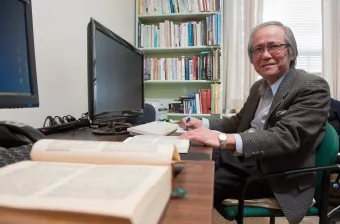Asia is the home of the most ancient and longest-lived civilizations the world has witnessed and of most of the world’s present population. Moreover, recent history would be impossible to write without frequent reference to Asia.
Many of the momentous events of modern times can be evoked by the names of Asian countries: Japan, China, Korea, Vietnam, India, Pakistan, Southeast Asian countries, and Middle Eastern countries. The resolution of many of today’s pressing issues requires an understanding of the needs and interests of the Asian peoples.
Declaring a Minor
Current students can declare a minor in this program through their myUPEI account.
Need more information about Asian Studies?
The personal information requested on this form is collected under Section 31(c) of the PEI Freedom of Information and Protection of Privacy Act. Read our Disclaimer.
Note: Current UPEI students should refer to Student Planning in myUPEI and the UPEI Academic Calendar governing their entry year, and speak to an academic advisor about course requirements. The course structure presented for this program is a recommended, unofficial progression for prospective students.
The Asian Studies minor consists of twenty-one (21) semester hours of credit (seven courses in total). To obtain a degree with a Minor in Asian Studies, a student must successfully complete:
- Either AST 2010 or AST 2020
- One course from the Asian Language Courses group
- One course from the Asian Studies Electives group
- Four courses taken from:
- the Asian Language Courses group,
- Korean Studies Courses group,
- Asian Studies Electives group, and/or
- Asian Studies Special Topics/Directed Studies group.
Note: Students are allowed to declare only one minor option, either Asian Studies or Korean Studies.
Guidelines for Taking Core and Elective Courses
Asian Studies at UPEI is a flexible interdisciplinary program. For this and other reasons, we have developed no formal regulations regarding when you should take the core and elective courses and how you can integrate them. But here are some flexible guidelines:
Most of the elective courses are introductory courses, which can be completed in your second, third, and fourth years at UPEI. You can take the Asian language courses (AS 1010 and AS 1020) in any semester/year we offer them, but we encourage you to complete at least AS 1010 (Introduction to Japanese I) by your second year.
We also encourage you to take core courses (Asian Studies 2010 and 2020) in the first or second year, so that you can have a broad introductory preparation in Asian Studies before taking the electives offered by Religious Studies, Sociology/Anthropology, and Political Studies.
If this is not possible due to your Major requirements and academic schedule, then you may take Asian Studies 2010 and 2020 even in the junior and senior years, while taking some of the electives or after completing them.
The core courses will be offered every other year, alternating with the Japanese language courses: Asian Studies 2010 in the first semester, and Asian Studies 2020 in the second semester. But not all electives are offered every year because the participating departments have their own curriculum needs and plans. Accordingly, try to take the required number of electives as they are offered in different years.
For any questions or further guidelines, contact the Faculty of Arts (artsadmin@upei.ca).
Asian Studies Courses
Core Introductory
2010 Introduction to West Asia
2020 Introduction to East Asia
Special Topics and Directed Studies
2090 Special Topics
3090 Special Topics
4090 Special Topics
4510-4520 Directed Studies
Asian Language Courses
1010 Introduction to [a selected language not listed below] I
1020 Introduction to [a selected language not listed below] II
1011 Introduction to Japanese I
1012 Introduction to Korean I
1013 Introduction to Mandarin Chinese I
1021 Introduction to Japanese II
1022 Introduction to Korean II
1023 Introduction to Mandarin Chinese II
Korean Studies Courses
2101 Korean Civilization
2201 Korean Society and Culture
2301 Korean Religions
2401 Media and Pop-culture in South Korea
3101 Modern Korean History
3201 Korean Art: Traditional and Modern
3301 Korean Cinema
Asian Studies Electives
Peoples and Cultures
Sociology/Anthropology 2120 Peoples of South Asia
Religion and the Arts
Religious Studies 2210 Buddhism East and West
Religious Studies 2420 Hindu Religious Tradition
Religious Studies 2510 Japanese Religion and Culture
Religious Studies 2610 Religion and Philosophy in China
History and Politics
Political Science 3430 - Comparative Politics of South Asia
Political Science 3630 - Comparative Politics of the Middle East


UPEI provides a solid education in the liberal arts, committed to rigorous study and inquiry, belief in the value of knowledge, lifelong capacity-building, and the development of the whole person.
High School Graduates
Canadian High School Equivalency Chart
Successful completion of Grade 12 examinations in a University Preparatory Program with an overall average of at least 70% (75% for Quebec Secondary V students) in the following subjects:
- English;
- one Social Studies or Language;
- any 3 other academic courses. Grade 12 math recommended.
Note: Grade 12 Math is a prerequisite for some 1st year Arts courses.
Please refer to the UPEI Academic Calendar for complete admissions information.


Each year we award over 3,000 scholarships and awards to qualified students. Our comprehensive program—valued at over $8 million—includes some awards that are equal to full tuition and renewable!
UPEI's undergraduate tuition is the second-lowest in the Atlantic region, and we offer millions of dollars in scholarships and awards.
Tuition
$6,828 per year, based on 30 credit hours ($682.80 per 3 credit course).
International students pay $8,010 per year in addition to full-time student tuition.
For a complete breakdown of part-time or full-time study as a student in the Faculty of Arts, visit our Tuition and Fees page.
Scholarships and Awards
UPEI supports you and your educational goals. We administer millions of dollars in scholarships and awards to our undergraduate and graduate students every year. Depending on your faculty or program, and year of study, you may be eligible for available awards.
Search the complete list of scholarships for information and application forms.
Celebrating Student Achievement
Including Guaranteed Entrance Scholarships and Academic Excellence Awards, these awards recognize the academic achievements of all students who meet the eligibility criteria while studying towards their first undergraduate degree.
Visit the Scholarships site for complete information.




